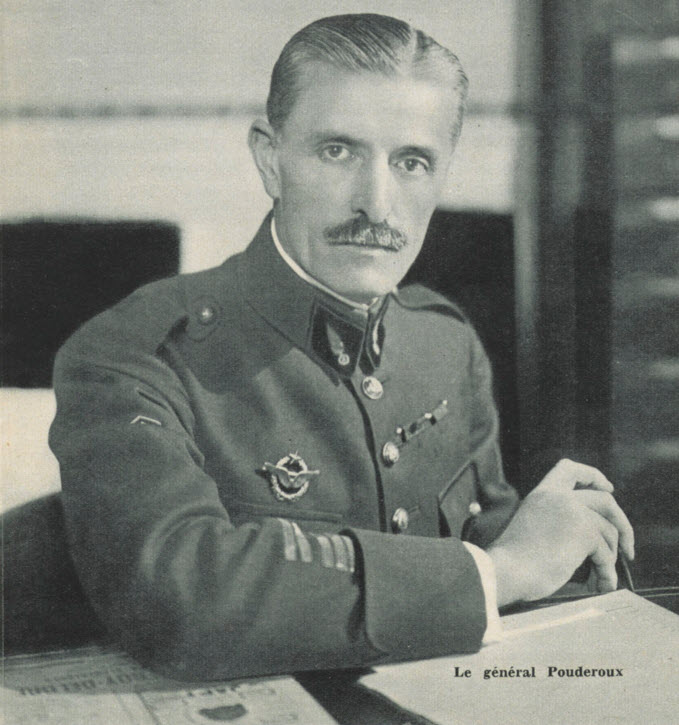Paul Pouderoux on:
[Wikipedia]
[Google]
[Amazon]
Paul Pouderoux (11 February 1874 − 21 June 1956) was a French 
officer
An officer is a person who has a position of authority in a hierarchical organization. The term derives from Old French ''oficier'' "officer, official" (early 14c., Modern French ''officier''), from Medieval Latin ''officiarius'' "an officer," fro ...
.

Biography
DuringWorld War I
World War I or the First World War (28 July 1914 – 11 November 1918), also known as the Great War, was a World war, global conflict between two coalitions: the Allies of World War I, Allies (or Entente) and the Central Powers. Fighting to ...
, he first was an air force pilot
An aircraft pilot or aviator is a person who controls the flight of an aircraft by operating its Aircraft flight control system, directional flight controls. Some other aircrew, aircrew members, such as navigators or flight engineers, are al ...
and afterwards was in command of a regiment
A regiment is a military unit. Its role and size varies markedly, depending on the country, military service, service, or administrative corps, specialisation.
In Middle Ages, Medieval Europe, the term "regiment" denoted any large body of l ...
of sapper
A sapper, also called a combat engineer, is a combatant or soldier who performs a variety of military engineering duties, such as breaching fortifications, demolitions, bridge-building, laying or clearing minefields, preparing field defenses ...
s. After the war he was commander of the regiment of military firefighter
A firefighter (or fire fighter or fireman) is a first responder trained in specific emergency response such as firefighting, primarily to control and extinguish fires and respond to emergencies such as hazardous material incidents, medical in ...
s of Paris
Paris () is the Capital city, capital and List of communes in France with over 20,000 inhabitants, largest city of France. With an estimated population of 2,048,472 residents in January 2025 in an area of more than , Paris is the List of ci ...
. In 1929 he was active in reorganising the International Technical Committee for the Prevention and Extinction of Fire (CNIF). He also organised the Committees congresses of 1929, 1931 and 1934 in Paris, as well as the “First International Exhibition of Firefighting”. He was also elected chairman
The chair, also chairman, chairwoman, or chairperson, is the presiding officer of an organized group such as a board, committee, or deliberative assembly. The person holding the office, who is typically elected or appointed by members of the gro ...
of the committee. He retired in 1934, after being promoted general
A general officer is an Officer (armed forces), officer of high rank in the army, armies, and in some nations' air force, air and space forces, marines or naval infantry.
In some usages, the term "general officer" refers to a rank above colone ...
. After his retirement, he was in charge of safety
Safety is the state of being protected from harm or other danger. Safety can also refer to the control of recognized hazards in order to achieve an acceptable level of risk.
Meanings
The word 'safety' entered the English language in the 1 ...
measures aboard ocean liners
An ocean liner is a type of passenger ship primarily used for transportation across seas or oceans. Ocean liners may also carry cargo or mail, and may sometimes be used for other purposes (such as for pleasure cruises or as hospital ships). The ...
.
General Pouderoux was active in leftist groups, such as the Republican Association of Old Combattants () which had been established in 1917 by intellectuals such as Paul Vaillant-Couturier
Paul Vaillant-Couturier (; 8 January 1892 – 10 October 1937) was a French writer and communist. He participated in the founding of the French Communist Party (PCF) in 1920.
Biography
Born into a family of actors, Vaillant-Couturier studied la ...
et Henri Barbusse
Henri Barbusse (; 17 May 1873 – 30 August 1935) was a French novelist, short story writer, journalist, poet and political activist. He began his literary career in the 1890s as a Symbolist poet and continued as a neo-Naturalist novelist; i ...
and whose philosophy
Philosophy ('love of wisdom' in Ancient Greek) is a systematic study of general and fundamental questions concerning topics like existence, reason, knowledge, Value (ethics and social sciences), value, mind, and language. It is a rational an ...
was inspired by the ideology of the Communist party on the 1930s. He also wrote pacifist publications such as the book “The aéro-chemical dangerimique or the dishonored war" or the article "Our international duty".
After the Liberation of France
The liberation of France () in the Second World War was accomplished through diplomacy, politics and the combined military efforts of the Allied Powers, Free French forces in London and Africa, as well as the French Resistance.
Nazi Germany in ...
he was maire of the commune of Saint-Paul (Alpes-Maritimes). At the request of the Firefighters Brigade of Paris, in 2003 the mairie
In local government, a city hall, town hall, civic centre (in the UK or Australia), guildhall, or municipal hall (in the Philippines) is the chief administrative building of a city, town, or other municipality. It usually houses the city o ...
of Tremblay-en-France
Tremblay-en-France (, ; before 1989: ''Tremblay-lès-Gonesse'',barracks
Barracks are buildings used to accommodate military personnel and quasi-military personnel such as police. The English word originates from the 17th century via French and Italian from an old Spanish word 'soldier's tent', but today barracks ar ...
of the Paris firefighters.
Works
* Le Danger Aéro-Chimique ou la Guerre Deshonorée - Imprimerie Centrale Administrative - 1936 * Le Devoir International - Les Peuples Unis, No. 12 01 Dec. 1936 (avec J. Prudrommeaux).References
French firefighters French generals 1874 births 1956 deaths {{France-mil-bio-stub